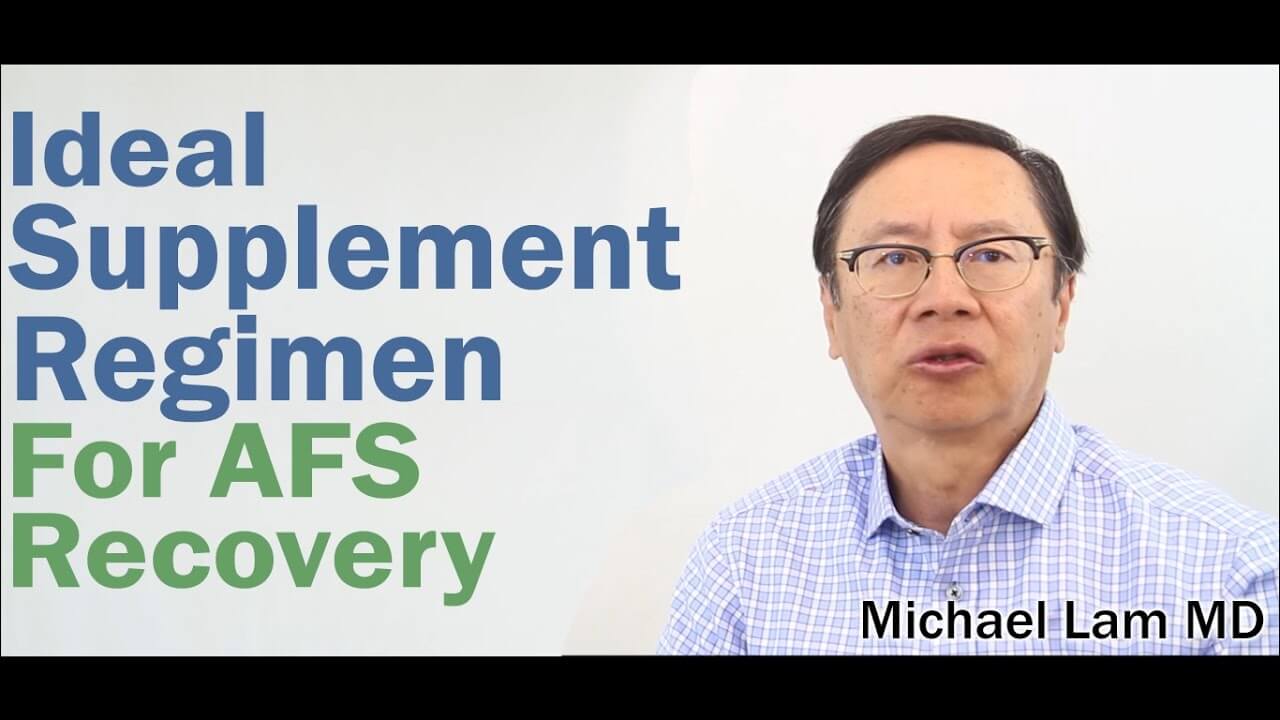
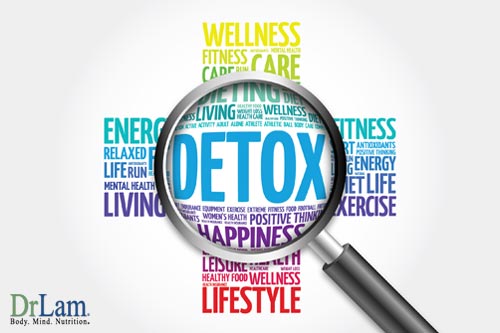 Detoxification and supplements tend to be key words in today’s society, with many people arguing over the best detoxification process to follow and which supplements are necessary for ongoing health. It is not as simple as that, however, because cellular inflammation plays a large role with regards to the effectiveness of different types of detoxification as well as the supplements one should be using.
Detoxification and supplements tend to be key words in today’s society, with many people arguing over the best detoxification process to follow and which supplements are necessary for ongoing health. It is not as simple as that, however, because cellular inflammation plays a large role with regards to the effectiveness of different types of detoxification as well as the supplements one should be using.
What exactly is meant by Cellular Inflammation? Normally, inflammation is easy to identify. You get a splinter in your finger, and the area becomes red and swollen, painful, and warm. Another example is when you sprain your ankle. That ankle not only becomes extremely painful to walk on, but it is also warm and swollen. These are typical signs of inflammation.
But there are other types of inflammation present in our bodies of which we may not even be aware. These infections are indications of a deeper problem associated with your endocrine system. Inflammation that is unnoticed usually occurs at the cellular level. More often than not, it initiates chronic diseases and is known to disrupt your hormone signaling networks – resulting in hormonal imbalance.
The point is that cellular inflammation is the body’s response to any microbes that infect it. Cellular inflammation is the result of the body’s constant bombardment by toxic waste, free radicals, bacteria and viruses, pesticides, pollution, beauty and body care products. This can even come from the gasses released from our carpets and furniture in our homes, or the contaminants found in our food due to the injudicious use of steroids, hormones, and pesticides. The result is that the body’s immune system cannot cope and becomes inflamed. In effect, we are potentially subjected to a variety of chronic illnesses including: asthma, Crohn’s disease, various allergies, lupus, rheumatoid arthritis, osteoarthritis, inflammatory bowel disease, diabetes, diabetes, emphysema, chronic bronchitis, depression and its associated symptoms, and even certain types of cancer.
There are also a number of lifestyle factors that also contribute towards cellular inflammation. These include: smoking, excessive alcohol consumption, oral hygiene (lack thereof), a poor diet, obesity, high stress levels, and too little exercise.
Your hormones are directly linked to your endocrine system. Where there is a dysfunction in the endocrine system, a hormonal imbalance is created which directly affects your body’s immune response to cellular inflammation.
How does inflammation lead to disease? By itself, inflammation is not a bad thing. It means your body’s immune system is responding to a situation in order to heal itself. Cortisol, a hormone produced in the adrenal glands, plays quite an important role when it comes to the regulation of your body’s immune system. When your cortisol levels are too high or too low, however, cortisol no longer functions as it should regarding the regulation of your immune system. The result is often allergies, chronic inflammation, and even autoimmune diseases.
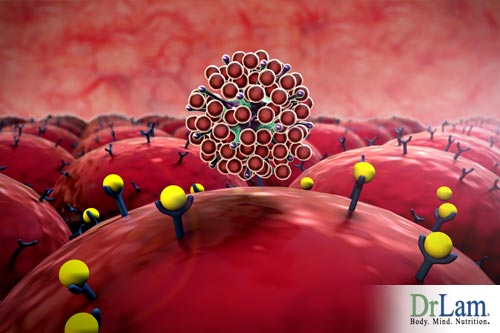 One of cortisol’s many functions in the human body is the reduction of inflammation. Under normal circumstances, when a pathogen enters your body, your immune system immediately responds by attacking it – in an effort to get rid of it. The result of your immune system working as it should is cellular inflammation. When your endocrine system works optimally, your cortisol will moderate the level of cellular inflammation caused by your body’s immune response. However, it does not eliminate it, since inflammation helps with the removal of the pathogen that caused the immune reaction in the first place.
One of cortisol’s many functions in the human body is the reduction of inflammation. Under normal circumstances, when a pathogen enters your body, your immune system immediately responds by attacking it – in an effort to get rid of it. The result of your immune system working as it should is cellular inflammation. When your endocrine system works optimally, your cortisol will moderate the level of cellular inflammation caused by your body’s immune response. However, it does not eliminate it, since inflammation helps with the removal of the pathogen that caused the immune reaction in the first place.
A problem arises when your cortisol levels are out of balance. Depending on your stage of adrenal fatigue, it can be either too high or too low. While still in the early stages of adrenal fatigue, your cortisol levels are elevated as your adrenal glands try to make more and more cortisol in order to cope with the stressors it encounters. During this stage, the elevated cortisol levels help as an immune suppressor, reducing the inflammation.
The reason why this happens it quite simple. When we encounter a stressful situation, the body goes into fight or flight mode, and the adrenal glands produce more of the hormones cortisol and adrenalin in order to ready us to take action and either fight or flee if necessary. During this time, the production of other hormones is put on the backburner and your immune system’s effectiveness with it. This is because these functions are not perceived by your body as necessary for survival right at that point.
Under normal conditions, when the situation passes, all functions go back to normal, including your immune system. If, however, your stress does not decrease and in fact perhaps even increases, your body stays in a constant state of readiness with compromised functionality regarding the production of other necessary hormones and of course, your immune system as well. The longer this state of affairs lasts, the worse the long-term effects. Your body is not able to fight off infections and diseases easily, and you are prone to more infections.
You might now start to think that low cortisol levels are what you should aim for, but this assumption is incorrect. Due to continuous stress and the resulting rise in cortisol production, your adrenal glands get to a stage where they become fatigued and find it increasingly difficult to cope with the cortisol production the body continuously demands. The result is full-blown adrenal fatigue and a sharp decline in cortisol production. In effect, your body now produces too little cortisol because your adrenal glands are tired and overworked.
The regulating effect cortisol tends to have on cellular inflammation is now absent; the result tends to be chronic inflammation with its myriad associated symptoms, from obesity to autoimmune diseases, such as fibromyalgia and others mentioned.
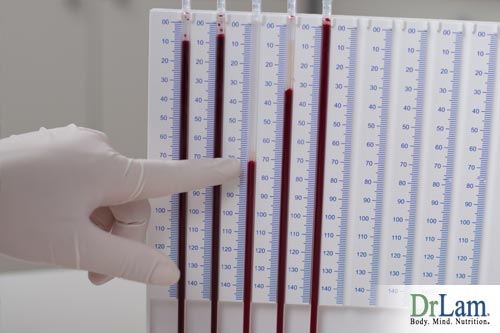 How do I know if I have cellular inflammation? The problem with cellular inflammation is that, so often, there are no physical signs present until you actually become ill. There are, however, a number of tests a healthcare practitioner could recommend if you think you are at risk. These tests include Erythrocyte sedimentation rate (ESR), C-reactive protein (CRP), and Plasma viscosity (PV) tests. They are all great indicators of inflammation.
How do I know if I have cellular inflammation? The problem with cellular inflammation is that, so often, there are no physical signs present until you actually become ill. There are, however, a number of tests a healthcare practitioner could recommend if you think you are at risk. These tests include Erythrocyte sedimentation rate (ESR), C-reactive protein (CRP), and Plasma viscosity (PV) tests. They are all great indicators of inflammation.
Although none of these tests are used to indicate a specific illness, they are indicators that you have an infection of some kind. Once this is determined, your healthcare practitioner will be able to submit you to further testing in order to ascertain your actual problem. Besides indicating the presence of inflammation, however, these tests are also great for monitoring the activity of your disease – if known. This means that if you have tested positive for a certain disease, these tests can be used to determine whether it gets worse, or whether there is a decline in cellular inflammation activity if any.
Unfortunately, anti-inflammatory medications only provide a temporary solution. They do not address the root cause of the problem and only suppress the inflammation. Steroids, on the other hand, fight infection while also slowing down your immune system, raising your risk for future infection or even diabetes, and causing mood swings. Statins, too, while great at fighting inflammation and reducing your chances of a heart attack, have side effects – such as muscle pains and a higher chance of developing diabetes.
There is, however, a long-term, natural approach that one can adhere to.
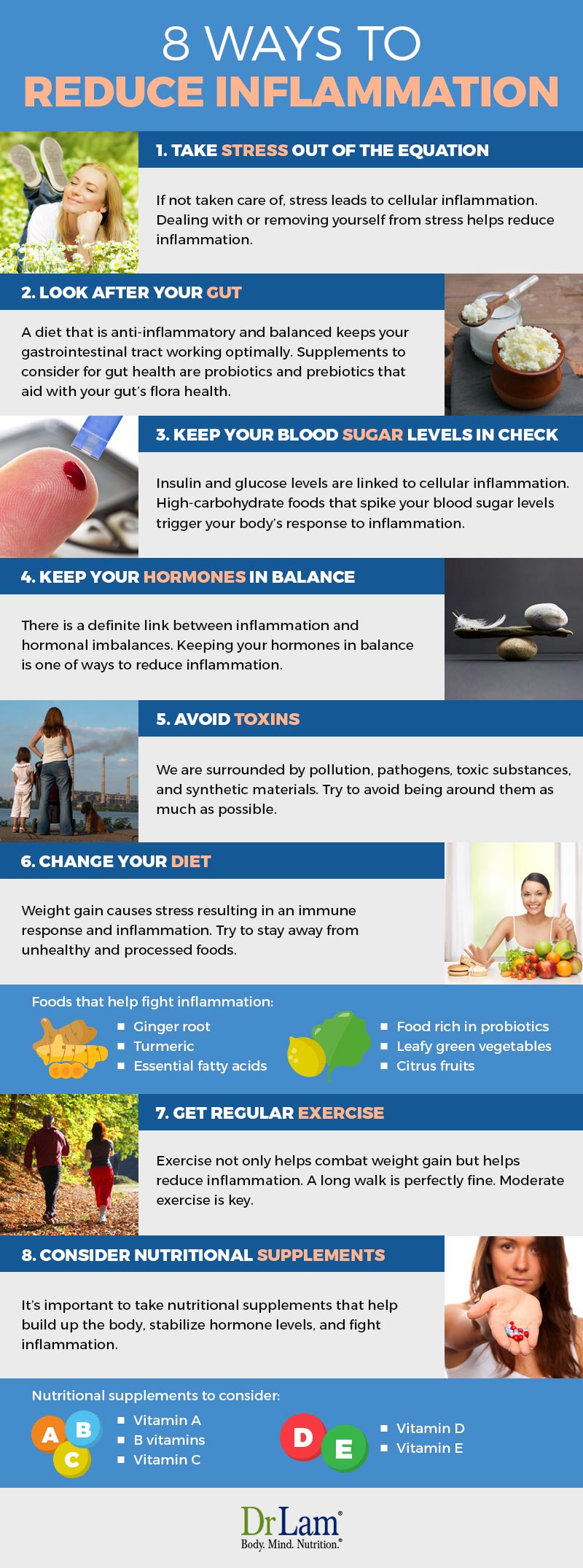
Anxiety, which usually manifests as a higher heart rate, panic attacks, or even night sweats can be a sign of elevated cortisol levels. By dealing with or removing yourself from situations that cause emotional stress, you immediately play a part in lowering your cortisol production and thus start the journey towards normalizing the body’s hormonal production and other bodily functions.
The same applies for physical stress, as it puts your body into the fight or flight mode and reduces your immune response. This, as mentioned, leads to cellular inflammation if conditions do not return to normal and are prolonged instead.
The wrong, or an unbalanced diet, is often the cause of inflammation. A diet that is anti-inflammatory and balanced keeps your gastrointestinal tract working optimally. Supplements to consider for gut health are probiotics and prebiotics that aid with your gut’s flora health.
Insulin and glucose levels are linked to cellular inflammation. High-carbohydrate foods that spike your blood sugar levels trigger your body’s response to inflammation.
There is a definite link between inflammation and hormonal imbalances.
This is more difficult than what it seems. We are surrounded by pollution, pathogens, toxic substances, and synthetic materials. Try to avoid being around them as much as possible.
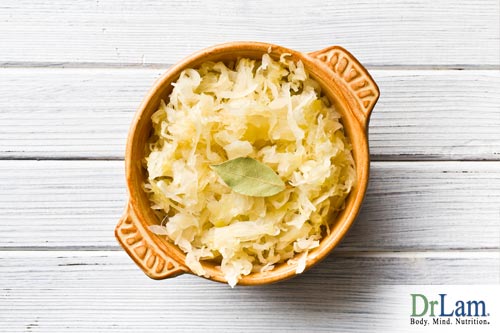 Weight gain causes stress resulting in an immune response and inflammation. Try to stay away from unhealthy and processed foods. Certain foods help fight inflammation. These include:
Weight gain causes stress resulting in an immune response and inflammation. Try to stay away from unhealthy and processed foods. Certain foods help fight inflammation. These include:
Remember to stay hydrated by drinking water.
Exercise not only helps combat weight gain but helps reduce inflammation. This does not necessarily mean going to the gym. A long walk is perfectly fine. Moderate exercise is key.
There are a number of nutritional supplements that help build up the body, stabilize hormone levels, and fight inflammation. These antioxidants include:
Vitamin A helps your immune system not to overreact and cause inflammation. Incorporating vitamin A rich food seems a better option than taking the vitamin orally. Too much vitamin A seems to cause birth defects and damage to the liver. There are two forms of Vitamin A, namely carotenoids and retinoids. Retinoids are to be found in animal products, while carotenoids (also called carotenes) give certain fruits such as carrots, papaya, and sweet potatoes their color. It is also present in green leafy vegetables.
High doses of carotene supplements are linked to heart disease and cancer, however. Do not summarily take these supplements without a healthcare practitioner’s advice as to dosage.
Low levels of the B vitamins have been linked to oxidative stress and the occurrence of inflammation. While each B vitamin has its own specific function in the production of different hormones, lower levels result in a hormonal imbalance, increasing the risk of cellular inflammation.
Foods high in B vitamins include tuna, squash, turnips, turkey, chicken, broccoli, and cauliflower.
Too much vitamin B, however, has negative consequences, including nausea and vomiting, liver problems, skin problems, and blurred vision.
Vitamin C is a powerful antioxidant that works at getting rid of the free radicals in your body. Less free radicals mean less inflammation-inducing triggers. Taken in high dosages, though, you could end up with an upset tummy. Those who are undergoing cancer treatment or who take drugs for high cholesterol should consult their healthcare practitioner before taking a vitamin C supplement.
Certain inflammatory illnesses such as arthritis, inflammatory bowel disease, and lupus, show a strong link to lower levels of vitamin D. Research shows vitamin D reduces pain caused by inflammation. The best vitamin D supplement, however, does not come in either pill or food form, but from the sun. It is also naturally available in liver, fish, beef, and egg yolks.
Certain medications tend to have a negative effect on your body’s vitamin D levels, while higher levels of vitamin D have an effect on blood pressure levels and diabetes. If you have diabetes or blood pressure problems, it is best to consult a healthcare practitioner before taking vitamin D supplements.
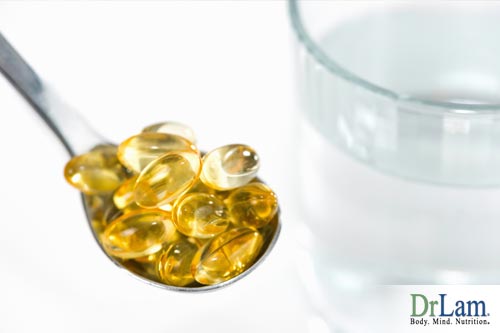 Vitamin E not only has anti-inflammatory properties but helps with various chronic skin conditions as well. Do not embark on a course of vitamin E if you are taking a blood thinner, such as warfarin or aspirin. It will only increase your chances of bleeding – as it tends to thin your blood.
Vitamin E not only has anti-inflammatory properties but helps with various chronic skin conditions as well. Do not embark on a course of vitamin E if you are taking a blood thinner, such as warfarin or aspirin. It will only increase your chances of bleeding – as it tends to thin your blood.
Cellular inflammation is the result of a combination of mostly lifestyle orientated factors. It can be cured, however, by taking a natural approach to your health and diet. Consistency, however, is the leading factor when it comes to your progress as far as your health is concerned.
